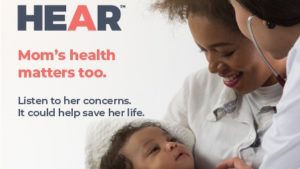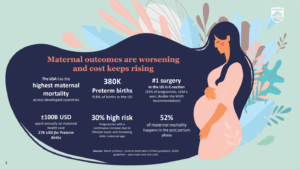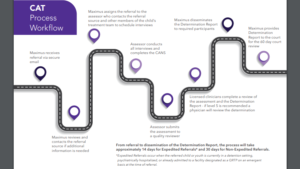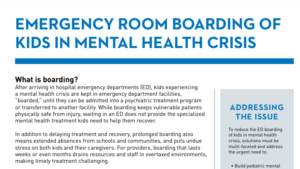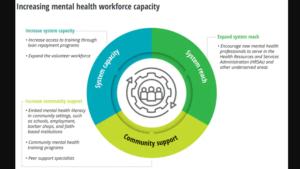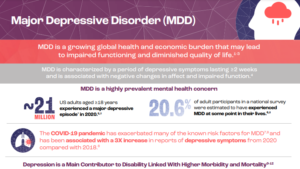
Youth Mental Health & Maternal and Infant Health Insights
NGA has collated a variety of resources from stakeholders to assist Governors and their staff with strengthening youth mental health, and improving maternal and infant health. These resources leverage the expertise of NGA partners to provide insights to assist with delivering specific program areas and cross-program tools and best practices. This page will continually be updated with timely and actionable resources.

Shifting Upstream: State Actions to Support School-Based Mental Health Screening
Addressing the US’s youth mental health crisis requires us to screen more children for relevant conditions to enable appropriate intervention earlier. Universal screening can be advanced by meeting kids where they are: in schools.
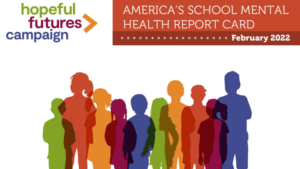
America’s School Mental Health Report Card
School mental health services play an important role in supporting youth and helping every child thrive. This report highlights what each state is doing to support school mental health services and provides policy recommendations and examples of policy pacesetters from across the country.
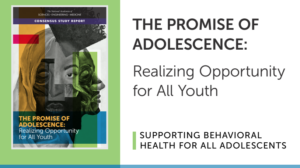
Supporting Adolescent Health and Development
A brief highlighting the specific findings on youth behavioral health from two National Academies of Sciences, Engineering, and Medicine reports: The Promise Of Adolescence: Realizing Opportunity For All Youth and Promoting Positive Adolescent Health Behaviors And Outcomes: Thriving In The 21st Century.

Addressing Maternal Health Disparities: Doula Access in Medicaid
This report discusses how women using doulas in Medicaid have fewer inpatient hospital admissions during pregnancy, are more likely to attend their postnatal visit, experience lower odds of cesarean delivery, have lower odds of postpartum depression or anxiety, and have lower overall costs compared to women not using doulas.

Racial and Ethnic Disparities in Maternal Health
This report analyzes the latest trends in severe maternal morbidity by examining nearly 11 million births to women with either commercial insurance or Medicaid. Additionally it offers action items that can be taken to reduce SMM and improve maternal outcomes.

What is Health Equity?
“Health equity means that everyone has a fair and just opportunity to be as healthy as possible. This requires removing obstacles to health such as poverty, discrimination, and their consequences, including powerlessness and lack of access to good jobs with fair pay, quality education and housing, safe environments, and health care.”
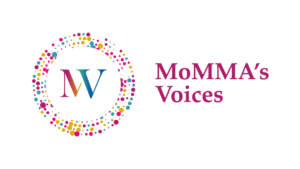
Maternal Mortality and Morbidity Advocates’ Voices
The MoMMA’s Voices Coalition works to amplify the voices of people who have experienced pregnancy and childbirth complications or loss, ensuring they are equipped and activated as partners with providers and researchers to improve maternal health outcomes.
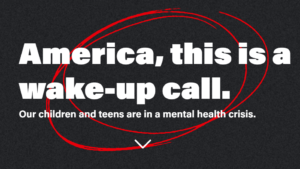
Sound the Alarm for Kids
In October 2021, the Children’s Hospital Association, American Academy of Pediatrics, and American Academy of Child and Adolescent Psychiatry declared the kids’ mental health crisis a national emergency and launched Sound the Alarm for Kids to raise awareness of the national emergency in child and adolescent mental health.

Tracking Public-Health Outcomes Across the United States
A selection of the public health outcome metrics in this dashboard measures the total loss of healthy years of life, assuming full health, that affect a state’s population over the course of one year, including metrics on behavioral health and maternal and neonatal health.

Workshop on Advancing Maternal Health Equity and Reducing Maternal Mortality
The National Academies convened a Workshop which reviewed the current state of state of maternal health in the United States and explore promising models and approaches that apply a life course approach to advance maternal health.

Expanding Access to Mental Health Care Across America
Sixty million Americans struggle with a mental health condition, but less than half receive treatment. The shortage is particularly acute for children and adolescents. Blue Cross and Blue Shield companies are committed to confronting and addressing inequities in mental health care.

Increased Mental and Behavioral Healthcare Needs of Millennials and Older Gen Z Adults
Elevance Health analysis shows Millennials and Gen Z adults are prioritizing their mental health and well-being and taking a proactive approach their healthcare decisions. This resource provides additional information on how Elevance Health is addressing the behavioral and mental healthcare needs of all our members, at every age, by expanding virtual care, providing resources to advance health equity, and improving overall access to care.

Study on Personal Oral Infection Control, Low Birthweight, and Preterm Births in Appalachia West Virginia
A 12-year study with the University of West Virginia School of Public Health noting that healthy brushing can lower preterm births and improve birth weights. Includes Philips Sonicare electronic toothbrush utilized in the cohort that showed these significant improvements.

Centering Youth and Families in Behavioral Health: A Data-Driven Approach
Youth behavioral health is in a state of crisis, exacerbated by the disruption and isolation caused by the COVID-19 pandemic. A significant driver of the crisis is the complexity of the youth behavioral health system. Having a data-driven view will enable more-effective investment and advocacy toward building a robust, patient-centric youth behavioral health system.

Stop. Ask. Listen.
This site contains resources for families and caregivers and has resources for youth who are looking for assistance including: Awareness to “Stop. Ask. Listen.” which could be adopted by states as part of an awareness campaign; Mental Health Awareness Guilds for Young Adults, for Parents and Caregivers, and a Guide to Talking with Friends and Family about Mental Health; Resources for accessing MH services.

Coordinating Mental Health and Substance Use Disorder Services and Supports in Medicaid
This Elevance Health report details how services and supports used by individuals with mental health conditions and/or substance use disorders (MH/SUD) are deeply intertwined with physical health conditions and social drivers of health. Medicaid managed care organizations are addressing fragmentations of MH/SUD services for all ages by implementing a whole person approach that integrates care and advances the delivery of person-centered services and supports.

Nowhere To Go: Maternity Care Deserts Across The U.S. (2022 Report)
March of Dimes’ biennial report on maternity care deserts across the United States—counties where there’s a lack of maternity care resources, where there are no hospitals or birth centers offering obstetric care and no obstetric providers.

Focusing on Children’s Mental Health
By investing in prevention, surveillance and treatment, children will grow up healthier and develop the skills they need to go on to more successful and fulfilling lives. Learn more about children’s mental health and how children’s hospitals are addressing these challenges in this detailed fact sheet.


